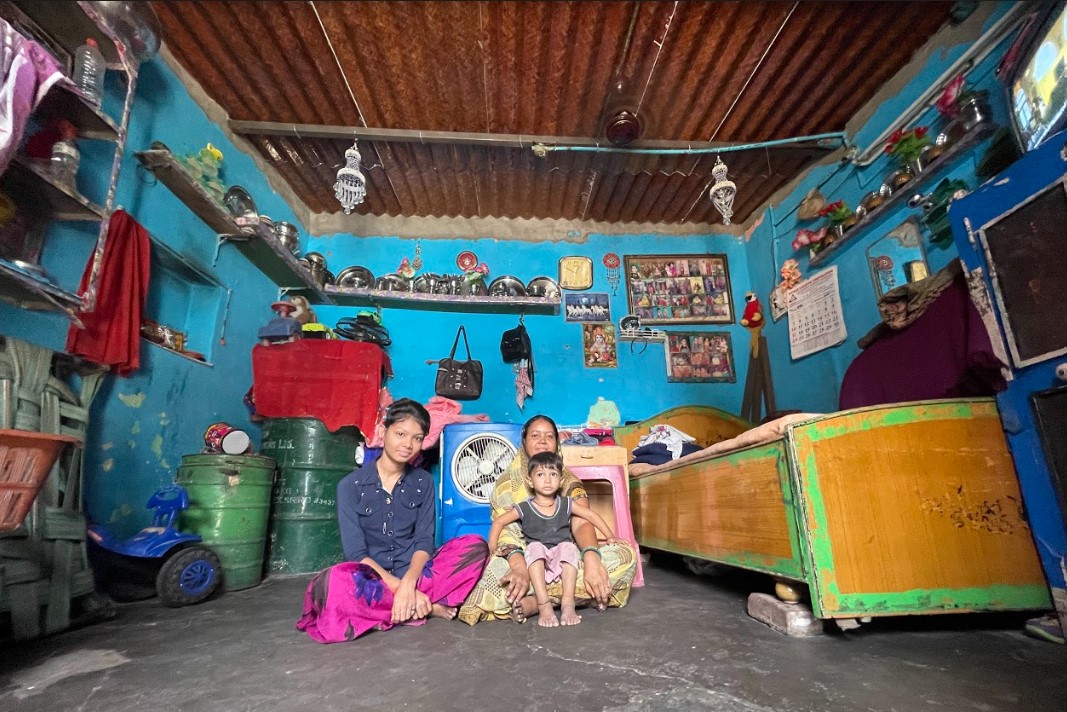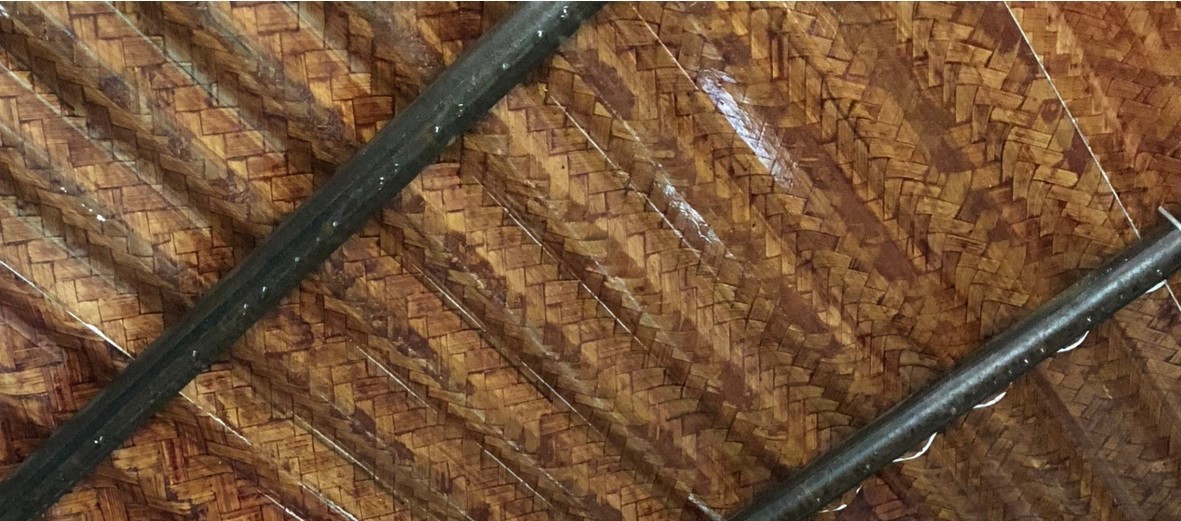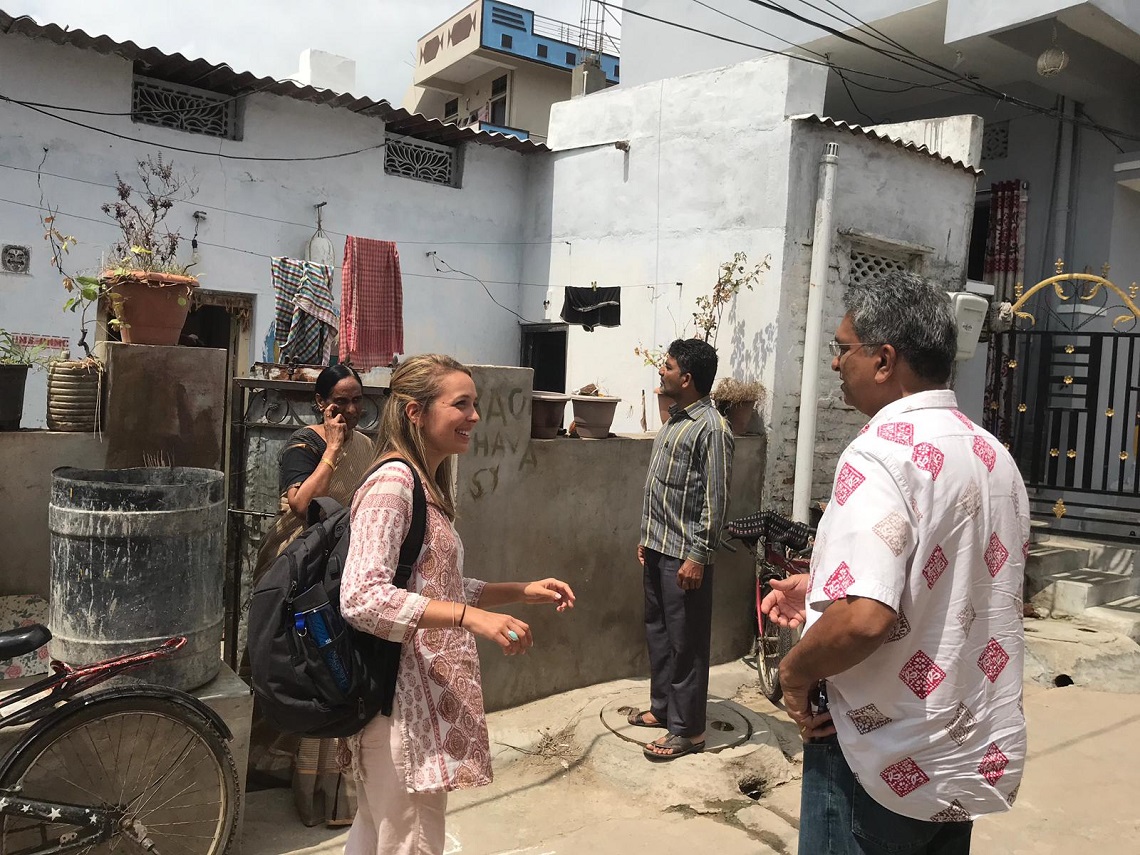Revolutionary Roofing
Gates Foundation veteran Alexa Bednarz launches a social venture bringing sustainable shelter to India
An international team of researchers and engineers is evaluating a prototype of a remarkable roofing material for use in India’s often scorching climate, where temperatures regularly exceed 110 degrees Fahrenheit. The potential benefits are extraordinary. The material is lightweight, yet durable. It is low-cost. And, crucially, it is cooling, lowering temperatures in homes by up to seven degrees.
What is this miraculous material? Bamboo, which grows naturally and abundantly in much of the planet’s warmer climates.
Alexa Bednarz (BA 2012) is the founder and CEO of Eco-Shelter, a social enterprise advancing the use of bamboo in roofing in India and beyond. Eco-Shelter recently received a nearly $1 million award from the National Science Foundation (NSF) for research and development on bamboo roofing products.
Sustainable shelter
Much of the roofing in low-income areas in India is made from asbestos cement sheets, material that is toxic and prone to damage, Bednarz explains. “So, people are constantly having to repair or replace their roof when a storm comes. Bamboo roofing is stronger and more durable.”
Plus, bamboo is locally sourced and has a lower carbon footprint than metal roofing. “Building materials are one of the biggest contributors to greenhouse gases,” Bednarz says. “There is a lot of carbon output from the manufacturing process. Bamboo actually sequesters carbon from the atmosphere. By using bamboo, we are taking captured carbon and putting it into a long life-cycle material.”
There are additional community benefits as well. Eco-Shelter’s sheets will be produced regionally, creating job growth. And the roofing panels can be purchased via micro-finance loans, enabling low-income populations to have improved living conditions without going into crippling debt.
Research, development and distribution
To bring the product to market at scale, Eco-Shelter is partnering with Washington State University’s Composite Materials & Engineering Center. The team is developing the most efficient way to produce bamboo mats that are pressed and sealed to form a strong, lightweight, flame-resistant panel.
A half a world away from the laboratory in Pullman, Bednarz and her team are evaluating the performance of the first-generation product already in use. Bednarz recently returned from a trip to India, where she heard from many people that they feel a lot cooler and more comfortable in their homes with bamboo roofing.

Eco-Shelter engineers are prioritizing ease of installation, which is essential given limited access to specialized tools. “What’s really great about the solution we are developing is that it’s simple, and similar to use as the existing roofing in the market,” Bednarz says.
To widen distribution, Bednarz is establishing partnerships with nonprofits and non-government organizations. Eco-Shelter has a memorandum of understanding with the Mahila Housing Trust, one of the largest housing organizations in India. Eco-Shelter is also collaborating with micro-finance institutions to enable loans for low-income consumers.
Purpose + profit
The NSF grant will enable Eco-Shelter to explore domestic bamboo-based products as well. In the United States, corrugated roofing is generally not used for residential buildings, but it could be an appealing option for backyard patios or pergolas.

These additions to the product line would also better position Eco-Shelter to generate profit.
“Ultimately we are trying to develop a profitable product,” Bednarz says. “Building materials are a profitable industry. To get manufacturers, business and retailers incentivized and to reach millions of people, we need to go at it as a for-profit company.”
Foster to India (and back)
Prior to founding Eco-Shelter, Bednarz served in several roles at the Bill & Melinda Gates Foundation, including as a global health program officer in India. While living there, she identified roofing as a particular area of opportunity to improve the lives of millions of people living in poverty.
Bednarz’s path to entrepreneurship with a mission began in the Jack and Ann Rhodes Professional Sales Program at the Foster School. It was a course of study she selected with an eye towards what she is doing today. “I knew right away I wanted to work at a non-profit,” she says. “I was doing the Sales Program and interning at the Make-A-Wish Foundation, learning fundraising. And fundraising is a form of sales. It is the same principles.”
Today Bednarz is a mentor for the Rhodes Professional Sales Program, helping students with their own journeys. “The Principles of Selling was one of the most important classes I took in college, and it definitely influenced my work and career trajectory. So, I’m happy to be able to participate as a mentor and give back to the program.”

“Alexa’s accomplishment in the non-profit sector is one of the greatest examples of how learning how to sell can really help you change the world!” says Karen Bailey, co-director of the Rhodes Professional Sales Program. “I feel so fortunate that she shares her time, experience, and passion for helping others with our MKTG 335 sales students. She is always a top student choice and continues to give back to UW and the Foster sales program by referring us to other non-profit organizations and mentors.”
Patient capital
Looking ahead, Bednarz is seeking to expand her operations. To help fuel growth, she is in early discussions with investors. She pitches Eco-Shelter as an opportunity to better the lives of the impoverished, move to sustainability and generate a financial return—all with a single investment.
For Bednarz to want to move forward with a partnership, potential investors must be on board with all these goals.
“Taking investment is a really important decision for the company, and the type of work we are doing requires a specific type of investor,” she says. “It’s not a Silicon Valley VC investor that wants to make a 10X return from an app in the next couple of years. We need patient capital, and investors who know what we are doing is challenging, but that there is potential for both economic return and huge societal impact.”
